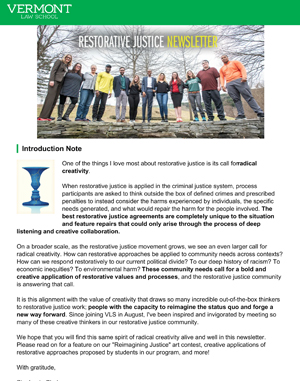The local food movement has strong roots in New England, and state government has an important role to play in supporting its continued growth. Each New England state has several policies in place to encourage or require institutional purchases of local foods. These policies differ from state to state and, in many cases, could be improved to better support institutional purchasing efforts. These are the findings outlined in a newly released report from Vermont Law School’s Center for Agriculture and Food Systems (CAFS) and Farm to Institution New England (FINE) entitled “Regional Trends in New England Farm to Institution Procurement Policy.”
FINE and CAFS partnered to research food laws and policies that affect local food purchasing by public institutions. Today, public institutions are playing an increasingly significant role in the movement for healthy, sustainable, and regionally produced food. Institutions like universities, primary schools, hospitals, and correctional facilities purchase large quantities of food for their cafeterias. Those that are funded with taxpayer dollars must adhere to strict purchasing regulations to ensure fair bidding. This highly regulated process has the unintended consequence of often excluding smaller producers like local farmers and fishermen who struggle to compete in a process that favors contracts for large volumes of food at the lowest price.
In response, New England states have enacted a variety of policies to strengthen the institutional purchasing of local food. This new report provides an overview of each of the states' laws across the region, identifies trends, and makes recommendations for policymakers, advocates, and researchers to consider.
Among its key findings, the report notes:
- Existing procurement processes create efficiencies and savings for purchasers, but can limit the effectiveness of state laws that mandate local purchasing.
- In the absence of impactful state laws, state agency advocates, institutions, community groups, and local governments are stepping in to advance local procurement goals.
Ultimately, the authors recommend that when establishing local food purchasing goals for institutions, states need to set specific metrics, commit to a timeline, and allocate resources to track progress.
“This research illustrates the strong interest and action across the New England states to put policy to work to promote institutional procurement of local food, and reveals ways we can better utilize state policy levers to achieve this goal,” comments CAFS Clinic Director Sophia Kruszewski.
The report’s authors lay out further recommendations for broader education, clarity of definitions, and increased public-private partnerships. “New England institutions are our community anchors,” says Peter Allison, FINE Executive Director. “The work conducted here with CAFS is part of FINE’s broader commitment to better understanding the institutional food system by collecting and disseminating data through our communications channels. By shining a light on institutions, we see what tremendous power they have to make a positive change in our food system.”
This report is accompanied by a set of six policy snapshots that explore each New England state’s laws in detail: Download the Report & view the State Snapshots.
This project is funded in part by the National Agricultural Library, Agricultural Research Service, and U.S. Department of Agriculture. Additional funding is provided by The John Merck Fund and the Henry P. Kendall Foundation.


















